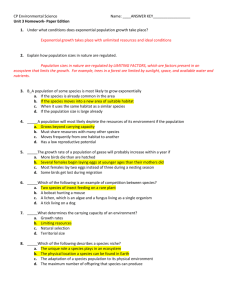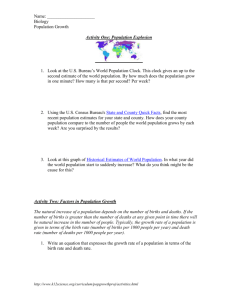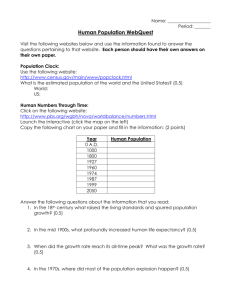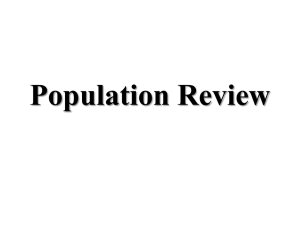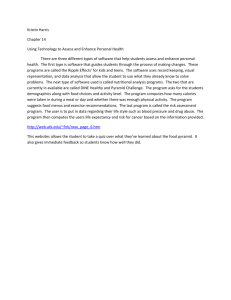Demographics and Population Dynamics Test
advertisement
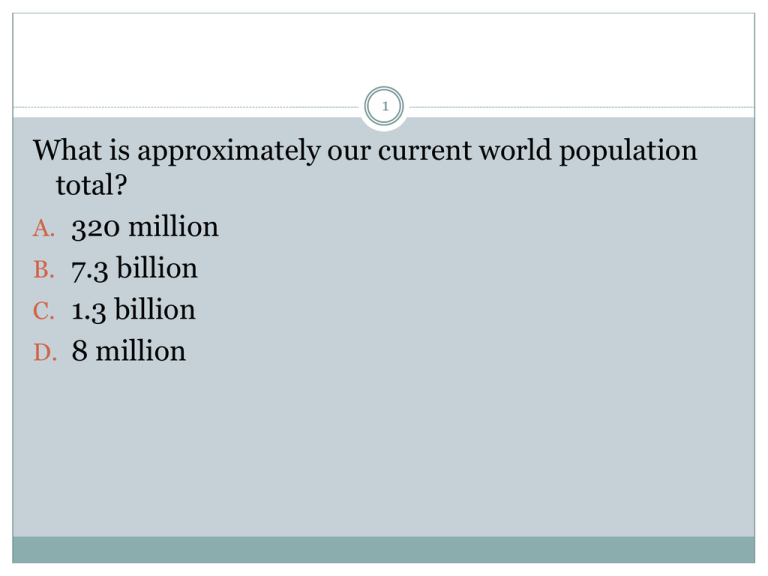
1 What is approximately our current world population total? A. 320 million B. 7.3 billion C. 1.3 billion D. 8 million 2 On the “Breathing Earth” site the United States turns red more frequently than any other country. This means that the United States… A. …has more total people than other countries B. …is having more births than other countries C. …is producing more carbon dioxide than other countries D. …is having more deaths than other countries 3 Most developed countries are emitting more carbon dioxide than they were four years ago. Sweden and Norway, however, are emitting less. This is most likely because… A. …their population has significantly lowered B. …they are driving less C. …they are using less energy D. …they are using alternative energy sources 4 Which has NOT been a major cause of the population explosion witnessed over the last 200 years? A. An increase in birth rates B. Modern medicine C. Improved sanitation D. Lower infant mortality E. Longer life expectancy 5 Which country is currently the most populous in the world? A. India B. China C. United States D. Mexico E. Russia 6 Which country is projected to be most populous in 2050? (different answer from #5) A. India B. China C. United States D. Mexico E. Pakistan 7 Which region has the population with the highest fertility rate and the lowest life expectancy? A. Southeast Asia B. Eastern Europe C. Latin America D. Sub-Saharan Africa 8 Which of the following is likely to be affected by population growth? A. Amount of land for agriculture B. Amount of clean water C. Amount of energy used daily D. Number of people who are unemployed E. All of the above 9 Which of the following indicators has NOT shown an increase in the past 200 years? A. Life expectancy B. Total fertility rate C. Urban (city) population D. Atmospheric carbon dioxide emissions E. Ecological footprint (resources used per person) 10 Which of the following indicators has NOT shown an increase in the past 200 years? A. Death rates B. “Dead zones” in the ocean C. Population facing chronic water shortages D. Average years of school E. Median age 11 Which of the following statements on population growth rate is accurate? A. It is higher right now than it ever has been in Earth’s history B. It is highest in developed countries C. It has slowed but remains high in developing countries D. Demographers don’t have a method to determine the growth rate 12 Based on its population pyramid, the Dominican Republic is most likely A. Developed B. Developing 13 Based on its population pyramid, France is most likely A. Developed B. Developing 14 Based on the population pyramid, what can be said about Honduras? A. More girls than boys B. Majority of the population is middleaged C. The country has poor health care D. High potential for future population growth 15 What can be said about New Zealand based on its population pyramid? A. Developing country B. Agriculture-based economy C. Fairly even age distribution compared to many developing countries D. Higher percentage of senior citizens compared to other age cohorts 16 Diverse industrial economy A. Developed B. Developing 17 Slower population growth A. Developed B. Developing 18 Lower average income A. Developed B. Developing 19 Agriculture-based economy A. Developed B. Developing 20 Rapid population growth A. Developed B. Developing 21 Life expectancy of 65 years or older A. Developed B. Developing 22 England A. Developed B. Developing 23 Jamaica A. Developed B. Developing 24 Canada A. Developed B. Developing 25 Australia A. Developed B. Developing 26 Kenya A. Developed B. Developing 27 India A. Developed B. Developing 28 United States A. Developed B. Developing 29 Guatemala A. Developed B. Developing 30 Japan A. Developed B. Developing 31 Germany A. Developed B. Developing 32 Djibouti A. Developed B. Developing 33 Italy A. Developed B. Developing 34 Indonesia A. Developed B. Developing 35 Kenya A. Developed B. Developing 36 Zimbabwe A. Developed B. Developing 37 What is the statistical study of human populations? A. Demography B. Ecology C. Entomology D. Biology 38 In this historical population pyramid for the U.S., the effects of the Great Depression (1930’s) can be most clearly seen in which age cohort? A. 0-4 B. 10-14 C. 25-29 D. 35-39 39 In this population projection for the U.S., which age cohort has lead demographers to label this era “The Graying of America”? A. 0-4 B. 20-24 C. 60-64 D. 75+ 40. 40 Which of the following CANNOT be determined from these population pyramids? A. Demographic transition occurred B. This country experienced a decrease in population growth rate over time C. This country could have been characterized as developed by 1920 D. This country had the highest potential for growth in 1880 41. 41 What do the different colors of the circles represent? A. B. C. D. Life expectancy Income per person Population of the country Region of the world 42. 42 What do the sizes of the circles represent? A. B. C. D. Life expectancy Income per person Population of the country Region of the world 43. 43 Which of the following statements is incorrect? A. China’s fertility rate was lower than India’s fertility rate in 1800. B. Total fertility rate has increased for most countries since 1800. C. China and India were the most populous countries in 1800. D. Women in 1800 were having about 4 – 8 children each. 44. 44 According to the relationship observed above, what measure could a country take to reduce its population growth rate? A. Pay families to have less kids B. Tax families who have more than two kids C. Create a program to educate the young women in the country D. Provide housing to couples who are involved in a family planning program 45. 45 Which statement is accurate? A. Wealthier countries generally consume more energy than poor countries. B. More populous countries seem to consume more energy. C. Developing countries always consume less energy than developed countries. D. Wealthier countries always pollute the environment more than developing countries. 46 7000 30000 6000 25000 5000 20000 4000 15000 3000 10000 2000 CO2 Emissions Population "The Breathing Earth" Population (in millions) Carbon Dioxide Emission (in million metric tons) 5000 1000 0 0 1750 1800 1850 1900 1950 2000 Year Which statement is inaccurate? A. The observed trend in the data started with the Industrial Revolution. B. The burning of coal for energy is one of the main reasons for the observed trend. C. The amount of carbon dioxide in our atmosphere will naturally level off even if we continue to consume energy in the same way. D. The use of more renewable energy sources could slow the observed trend. 47 500000 450000 Population 400000 350000 300000 A 250000 B 200000 C 150000 D 100000 50000 0 2000 2010 2020 2030 2040 2050 Year Which of the following scenarios would create population curve “B”? A. Women 15-19 years old having 5 kids each B. Women 25-29 years old having 5 kids each C. Women 15-19 years old having 2 kids each D. Women 25-29 years old having 2 kids each 48 In 1880 there were significantly less women than men between the ages of 25 and 34. Which of the following is the most likely reason for this? A. Disease-related deaths B. War-related deaths C. Deaths during child labor D. Deaths due to malnutrition 49. 49 In order for a population to stay steady (not go up or down), what is the approximate “replacement” fertility rate in developed countries? A. 4.2 children per female B. 2.1 children per female C. 1.5 children per female D. 7.0 children per female 50. 50 Considering total fertility rate is decreasing worldwide, which of the following projections is most unlikely? A. U.N. High B. U.N. Medium C. U.N. Low D. Not Enough Information
